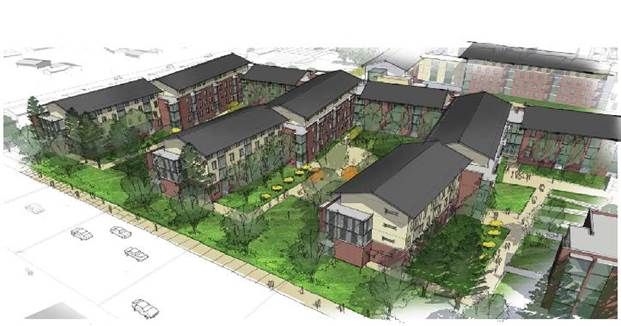
Targeted for completion in fall 2016, the Aggie Village redevelopment project will offer 973 beds in a global apartment community that will further position Colorado State as a leader in providing innovative living learning environments.
A student’s decision to live on campus beyond the first year live-on requirement is largely influenced by location, quality and sense of campus community; everything that the Aggie Village redevelopment embodies.
“We are excited to offer new on-campus apartment style living to undergraduate and graduate students as well as visiting scholars and post docs,” said Christie Mathews, director of CSU Apartment Life. “This community will provide a living-learning opportunity for students who are interested in a globally diverse, intercultural living experience.”
Currently Apartment Life hosts students from more than 80 nations. With more than 70 percent international residents, the university apartments offer an opportunity for students to develop cross cultural understanding and competence to help them be successful in a global marketplace while developing meaningful lifelong relationships.
To further the integration of academics into student housing, the Aggie Village redevelopment will also feature an academic component. According to Fred Haberecht, assistant director of Facilities Management, this will include general assignment classroom space and offices for student support services within the Division of Student Affairs.
Strategically placed on-campus location
Aggie Village sits at the southern edge of the CSU main campus between Lake Street and Prospect Road, at Center Avenue.
This on-campus location is a valuable asset to students and will accommodate both an increasing student body enrollment at Colorado State as well as allow more upperclass and graduate students to live on campus.
Funding for the $111 million project has been secured through bonds that will be paid by Housing & Dining Services, an auxiliary operation at CSU that is self-funded and does not receive any state, tax, tuition, or fee dollars. The bonds will be paid with room and board revenue.
Sustainability features included
As a part of CSU’s extensive commitment to sustainable building projects on campus, the project will pursue a LEED Gold certification with several innovative sustainability features being investigated and pursued including:
- A focus on alternative transportation with easy pedestrian access to campus, the MAX line located just two blocks from the project, and bike parking for 80 percent of residents; Housing & Dining Services also plans to provide a car-share program on site.
- The outdoor courtyards so popular in the former Aggie Village apartments will be re-envisioned in the redevelopment with shared outdoor space, a high priority with water-efficient landscaping throughout the complex.
- Several other sustainability initiatives are being explored, including a proposal for a living green wall to bring plants and greenery into the common space.
“This community will provide easy access to classes, labs, the Max, and the entire campus. We are providing more than 800 bike parking spaces, including some covered bike parking. Transportation alternatives are a key feature for students who will be living there,” Mathews said.
In addition to the many alternative transportation options, there will also be an underpass at Prospect and Centre, making it easier and safer for students who live there to access campus
“This is our first project with an urban edge. We expect that the northwest corner of Centre and Lake will become a vibrant urban corner: a place to hang out, meet your friends and be seen,” said Haberecht.